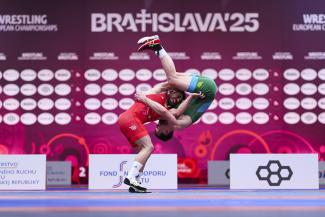Belt Wrestlers Fail Anti-Doping Test at Asian Indoor Martial Arts Games
Thursday, September 6, 2018 - 15:46 By United World Wrestling Press

CORSIER-SUR-VEVEY (August 30) – United World Wrestling has suspended traditional belt wrestlers Rejepaly Orazalyyev (TKM) and Dinara Hallyyeva (TKM) following violations of the organization’s anti-doping policy during the 5th Asian Indoor & Martial Arts Games 2017 in Ashgabat.
United World Wrestling issued the tests on September 16 and 21 respectively and had them processed through a WADA-accredited laboratory in Doha.
Orazalyyev’s test indicated the presence of Oxandrolone, which is classified under class S1.1a (Exogenous Anabolic Androgenic Steroids) and is prohibited at all times (in and out-of-competition). According to UWW’s records, no Therapeutic Use Exemption was delivered by UWW to justify the presence of Oxandrolone in the wrestler’s system.
Hallyyeva’s test indicated the presence of Meldonium, which is classified under class S4 (Hormone and Metabolite Modulators) of the 2017 Prohibited List and is prohibited at all times (in and out-of-competition). According to UWW’s records, no Therapeutic Use Exemption was delivered by UWW to justify the presence of Meldonium in the wrestler’s system.
A suspension of four years was imposed on Orazalyyev and will run from February 7, 2018 until February 6, 2022
A suspension of four years was imposed on Hallyyeva and will run from February 9, 2018 until 6 February 8, 2022


Share your thoughts.
Comments